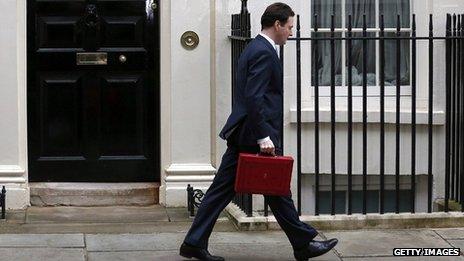Bit of a barney over Barnett
- Published

There is little agreement about what the Chancellor's announcement is worth
George Osborne made it eminently clear that times remain tough, with reduced forecasts on growth.
However, he made much of his determination to drive the economy upwards through capital investment, particularly in housing.
Translated for Scotland, that apparently means an extra £279m over the next two years. During the same period, day to day cash spending in Scotland will be cut by £103m. Leaving a net increase, say UK Ministers, of £176m.
But John Swinney, Scotland's Finance Secretary, adds up the sums rather differently.
He says the money withdrawn is real, solid cash - while the capital investment comes mostly in the form of loans or equity, primarily for housing, which has to be repaid and over which he has no discretion.
Mr Swinney was somewhat blunt in response to this. He called it a "con trick" and a "deceit". One of his aides said it was like losing cash and being offered a payday loan in compensation.
No, no, says Michael Moore, the Scottish Secretary. This is Scotland's share of comparable housing investment in England. Yes, it is mostly in loans or equity - but it will be real money, available for real houses and will help to boost the Scottish economy considerably.
And another row tonight, over oil. The Office of Budget Responsibility has published revised figures for the value of North Sea oil revenues from 2012/13 to 2017/18. Revised, in that it is £1bn down - and is now at £33bn.
By contrast, the Scottish Government's figures feature, as the least optimistic forecast, a figure of £41.5bn with upper limits also on offer.
The row? Supporters of the Union say the OBR figures ca' the feet from the SNP argument that Scotland, with oil, would more than pay her way.
In response, Mr Swinney says the OBR figures appear to neglect recent announcements of investment, underplay the industry's own forecasts of oil production and pitch the oil price too low.